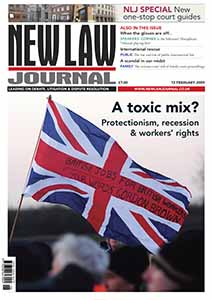
Peter Hungerford-Welch, associate dean, The City Law School, City University London. W www.city.ac.uk/law
David Burrows laments the ruinous costs’ toll of family proceedings
Roger Smith predicts an end to civil legal aid (and history) as we know it
It’s a £3.5m question: “Is a teacake a biscuit or a cake?”
In billing disputes is the client always right? asks Jonathan Pratt
Contractual clauses won’t always offer protection if you delay in reacting. Sara Partington reports
Law firms need to prepare for an increase in regulatory investigations. Greg Wildisen explains why
Arbitration
Peter Hungerford-Welch, associate dean, The City Law School, City University London. W www.city.ac.uk/law
Peter Hungerford-Welch, associate dean, The City Law School, City University London. W www.city.ac.uk/law
MOVERS & SHAKERS

NLJ Career Profile: Ken Fowlie, Stowe Family Law
Ken Fowlie, chairman of Stowe Family Law, reflects on more than 30 years in legal services after ‘falling into law’

Jackson Lees Group—Jannina Barker, Laura Beattie & Catherine McCrindle
Firm promotes senior associate and team leader as wills, trusts and probate team expands

Asserson—Michael Francos-Downs
Manchester real estate finance practice welcomes legal director







